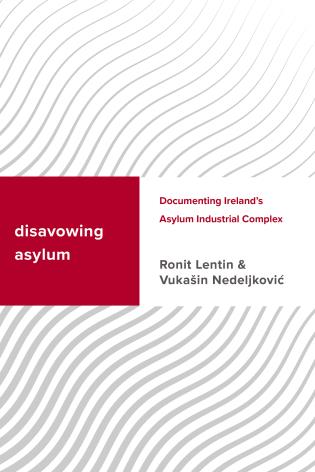The latest book in the Challenging Migration Studies book series is Disavowing Asylum: Documenting Ireland’s Asylum Industrial Complex by Ronit Lentin and Vukasin Nedeljkovic. Watch the book launch here.
Comments closedTag: Asylum Seekers
I was asked by Inference Review to write a response to an article by the German Marxist economist, Wolfgang Streeck, ‘Trump and the Trumpists‘. I thank Inference for the opportunity to write this response which I learnt a lot from. I am also very grateful that so many people have…
Comments closedAfter a few weeks silence due to other commitments, I am returning with the eighth blog post in the series to attend to the themes of borders and mobilities. My comments respond to Reece Jones’s book, Violent Borders: Refugees and the Right to Move which in sum I consider a good example of a lacuna I have observed at the heart of much critical thinking on the nature of borders – their overwhelming failure to consider the centrality of race. I will use the opportunity offered by the reading of this book to consider why I believe a race critical analysis should be central to work on borders and migration, what the dangers of ignoring race might be for an understanding of current urgencies. A broader question of what a reading which conceives of borders as inherently violent without thinking about the racialised nature of this violence means for our understanding of what the border does is one I leave for later on but which is triggered by the reading of this book to which the theme of violence is key. While my comments today will be relatively brief, I see these questions as being of major importance for my wider project on race and relationality; how can we suture in much of the vital work that is done in what we coul call ‘critical border studies’ into a framework that is attentive to race?
Comments closedI was delighted to be interviewed for the latest issue of the German Journal für kritische Migrations- und Grenzregimeforschung by Juliane Karakayali. Claudia Garcia-Rojas (@ClaudiaStellar) was kind enough to create this quote from the interview which you can read here. Save
Comments closedOn Monday June 20 I was interviewed by Raymond Grenfell on Indymedia on RTR FM (Perth) about the assassination of Jo Cox, the far right and racism in Britain and Australia. You can listen again here. I tried to talk about how mainstream politics nurtures the environment in which Jo…
Comments closed Reposting news of this very important action by Divest from Detention activists:
Reposting news of this very important action by Divest from Detention activists:
Text of pamphlet distributed at meeting of Australian Council of Superannuation investors annual conference, Melbourne, 10th May 2016.
This morning, 10th May 2016, the Divest from Detention network has targeted the annual conference of the Australian Council of Superannuation Investors (ACSI) in Melbourne:
Mandatory detention cannot be risk managed: close the camps
In August 2015, in the wake of HESTA’s decision to divest from Transfield, it was reported that ACSI was “seeking more information” on the situation in the Manus and Nauru detention camps. Just in case ACSI and its member funds haven’t noticed, people are still being raped, illegally detained, tortured and are still dying on Manus and Nauru, all on the dime of some of Australia’s largest super funds. Compensation for illegal detention on Manus Island is likely to run into the millions if not billions.
 On March 8 2016, Michael Pezzullo, Secretary of the Australian Department of Immigration and Border Protection, was moved to issue a press release. He felt compelled to defend the actions of his department against criticisms of what he called a ‘contentious area of public policy and administration’, the mandatory and indefinite detention of asylum seeker children. Critics on social media rushed to point out that the most telling part of Pezzullo’s statement was his comment that,
On March 8 2016, Michael Pezzullo, Secretary of the Australian Department of Immigration and Border Protection, was moved to issue a press release. He felt compelled to defend the actions of his department against criticisms of what he called a ‘contentious area of public policy and administration’, the mandatory and indefinite detention of asylum seeker children. Critics on social media rushed to point out that the most telling part of Pezzullo’s statement was his comment that,
Recent comparisons of immigration detention centres to ‘gulags’; suggestions that detention involves a ‘public numbing and indifference’ similar to that allegedly experienced in Nazi Germany; and persistent suggestions that detention facilities are places of ‘torture’ are highly offensive, unwarranted and plainly wrong – and yet they continue to be made in some quarters
It was the use of the word ‘allegedly’ that raised the most ire; the statement had made it sound like the DIBP was denying the magnitude of the Holocaust. Pezzullo followed up with another release:
Comments closedAny insinuation the Department denies the atrocities committed in Nazi Germany are both ridiculous and baseless… The term ‘allegedly’ was used to counter claims of ‘public numbing and indifference’ towards state abuses in Nazi Germany and the link to immigration detention in Australia. We reject the comparison to immigration detention as offensive and question this being made as a blanket statement – an allegation hence ‘allegedly’ – to describe the attitude of the German population at large during that terrible time.

Since I wrote this post I have had much time to reflect on the critique of it made by Angela Mitropoulos on her website. It is no defence that I wrote the original blogpost in a hurry and that I failed to reference the three articles linked to in the postscript or her own longstanding work on the subject, for example (but not exhaustively) here, here and here. It has also caused me to reflect on how to better represent the underpinnings of the knowledge I have gained in my work, and to avoid formulations that give the impression that they originated with me, or only with a selective literature.
As I tell my students, which of course is a well-founded antiracist principle that I did not invent, intentions don’t mean a thing. I cannot erase past mistakes, I can only strive to do better.
In an attempt to do so, I have left most of the post intact so that I do not create an impression after the fact that it was better than it was, but I have inserted references that I hope show the trajectory of the development of my thought, and might go some small and modest way towards redress.
Postscript March 1, 2016:
Always happy to be set right, it has been pointed out that when I hastily wrote the below on February 8, I omitted to reference three important articles which preceded my thinking here. These are “To Hell With Progressive Intentions” by Wenny, “Why Were Most Of The Anti-Reclaim Protesters White?” by Sanmati Verma, and “GetUp and the Amazing Disappearing of Women of Colour” Ardhra. It also adds to my own thoughts in response to this statement by Liz Thompson developed here in 2014.
I would also like to add that since I wrote this, further crucial reflections were added to the general topics by Carolina Lee, Ahmed, Sanmati, Tom, Matt, Liz and Angela Mitropoulos in this Roundtable discussion.
…
Here is the original post with inserted references in red.
I’ve been going at this question of what race does for the last few years. I’ve mainly been thinking about the question in relation to Barnor Hesse’s crucial explanation of the performativity of race which he explains in a fantastic lecture which can be watched below.
I’ve tried to explain some of the ways I have taken up those ideas in my recent work, a response to Michael Banton called What Does Race Do? and an article on Racism in Public or Public Racism, as well as my response to Karim Murji and John Solomos’s book, Theories of Race and Ethnicity (these are all available on my Academia page should they be behind a paywall).
At the moment, I am finishing off an unwieldy paper with the working title, ‘Not Doing Race in Australia’, on the absence of race in much Australian racism studies (to distinguish them from race critical or decolonial approaches). My focus is on the work that gets the big grants. (Ironically, given that I have recently been led to understand that neither writing these sorts of blog posts, collaborating with other scholars, or doing any form of activism or public engagement, despite the hype, gains one any institutional recognition of the value of your work, I should probably taking a leaf out of their book and use this time to apply for some research funding, but that is a topic for another day!).
Comments closedA Head-to-head published in The Guardian on 29 August 2014. On 11 August an anonymous group published an open letter to two ex-members of Pussy Riot. The group called on Masha Alyokhina and Nadya Tolokonnikova to withdraw from the Festival of Dangerous Ideas taking place this weekend at the Sydney…
Comments closed



